Top PagerDuty Alternatives for Incident Management in 2025
Written by: Hrishikesh Pardeshi, Founder at Flexiple, buildd & Remote Tools.
Last updated: Feb 25, 2025
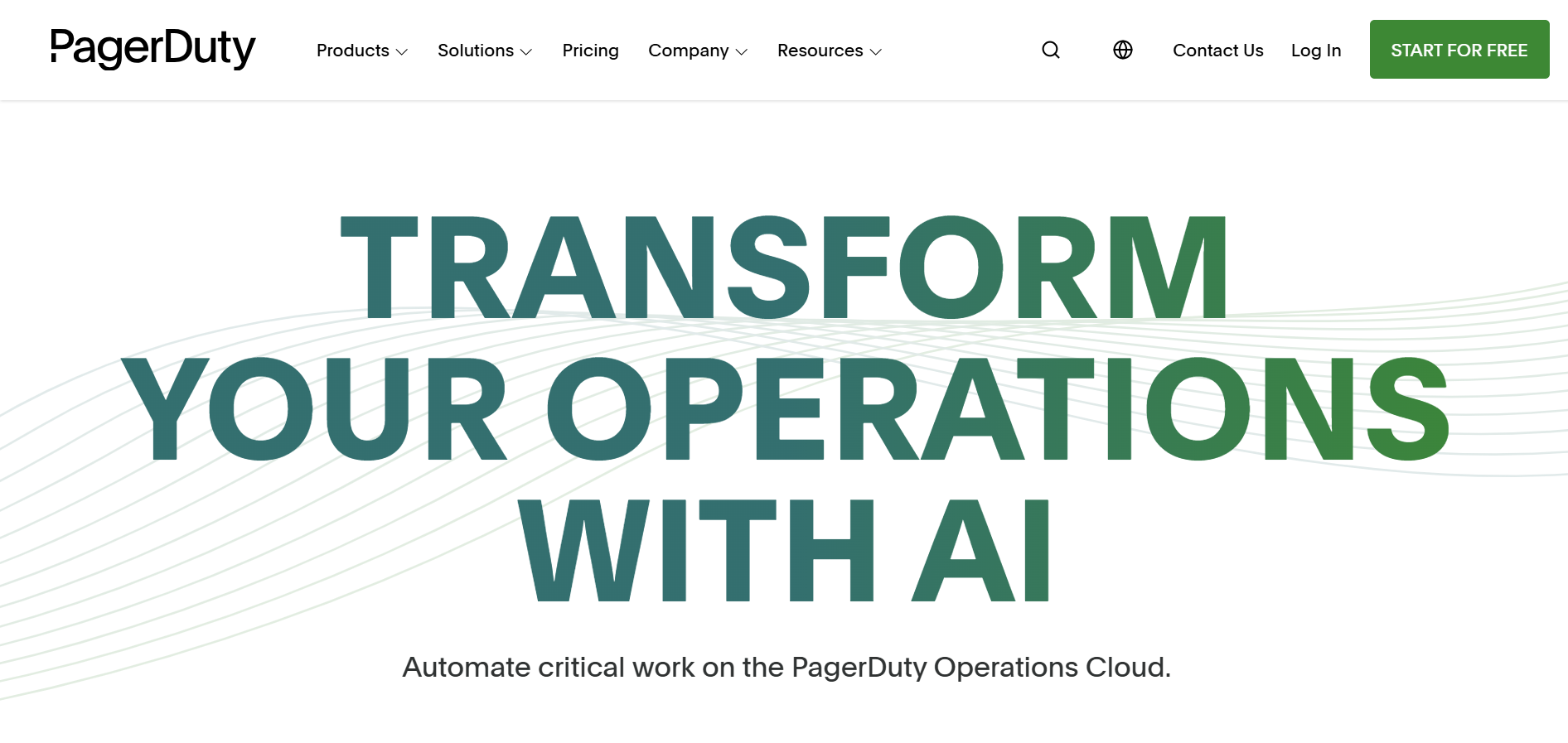
Best PagerDuty Alternatives are:
Opsgenie
VictorOps
xMatters
OnPage
Splunk On-Call
Alerta
Freshservice
In the dynamic field of incident management and alerting, selecting the right tool is crucial for ensuring efficient operations and rapid response times. As organizations grow, the need for more specialized or flexible alternatives to PagerDuty, with robust incident management solutions and automated incident response, becomes increasingly important. This guide explores the top PagerDuty alternatives available in 2025, highlighting their key features—including basic incident management features—and pros and cons, along with pricing to help you choose the best incident management software for your incident management needs.
Table of Contents
Why Do You Need Alternatives to PagerDuty?
As your organization's incident management requirements evolve, you might find that PagerDuty’s features, pricing, or integrations no longer perfectly align with your needs. Alternatives like Microsoft Teams can offer more specialized functionalities for incident response tasks, enhanced customization for incident management processes, or cost-effective solutions that better match your specific operational workflows. Evaluating different platforms ensures that your incident response process remains agile, efficient, and scalable, while keeping you updated with real-time incident status.
Who Should Consider Using PagerDuty Alternatives?
Choosing the right incident management tool is critical for organizations of all sizes. Whether you're a DevOps team needing robust alerting integrations, an IT operations team seeking advanced collaboration features, or a small business looking for cost-effective incident management, there are several alternatives to PagerDuty that cater to various needs. Understanding your operational requirements will help you select the platform that best suits your workflow.
Developers and IT Teams Focused on Automation
Teams that require deep integrations and automated workflows to streamline incident management can benefit from alternatives offering robust API support and automation capabilities.
Operations and DevOps Teams Needing Advanced Collaboration
For teams that need real-time collaboration and efficient on-call management, selecting a tool with strong incident routing and communication features is essential.
Organizations Seeking Cost-Effective Solutions
Small and medium-sized businesses or startups looking to manage incidents without high overhead costs should explore alternatives that offer flexible pricing models without compromising on key functionalities.
PagerDuty Alternatives Comparison Table
| Feature | Opsgenie | VictorOps | xMatters | OnPage | Splunk On-Call | Alerta | Freshservice |
|---|---|---|---|---|---|---|---|
| Ease of Use | Easy | Moderate | Moderate | Easy | Moderate | Easy | Easy |
| Pricing | Free & Paid Plans | Paid | Paid | Paid | Paid | Free & Paid Plans | Free & Paid Plans |
| Integrations | Extensive | Extensive | Comprehensive | Basic | Advanced | Flexible | Integrated |
| Collaboration Features | Strong | Strong | Excellent | Moderate | Advanced | Moderate | Robust |
| Special Features | Incident Analytics | On-Call Scheduling | Automated Workflows | Mobile Alerting | Data-Driven Insights | Open Source Flexibility | ITSM Integration |
Best PagerDuty Alternatives
Choosing the right incident management tool is vital for minimizing downtime and ensuring swift incident resolution. The following alternatives to PagerDuty offer varied features, pricing, and integrations to cater to different operational needs. Explore these platforms to find the best fit for your organization’s incident management and on-call requirements in 2025.
1. Opsgenie
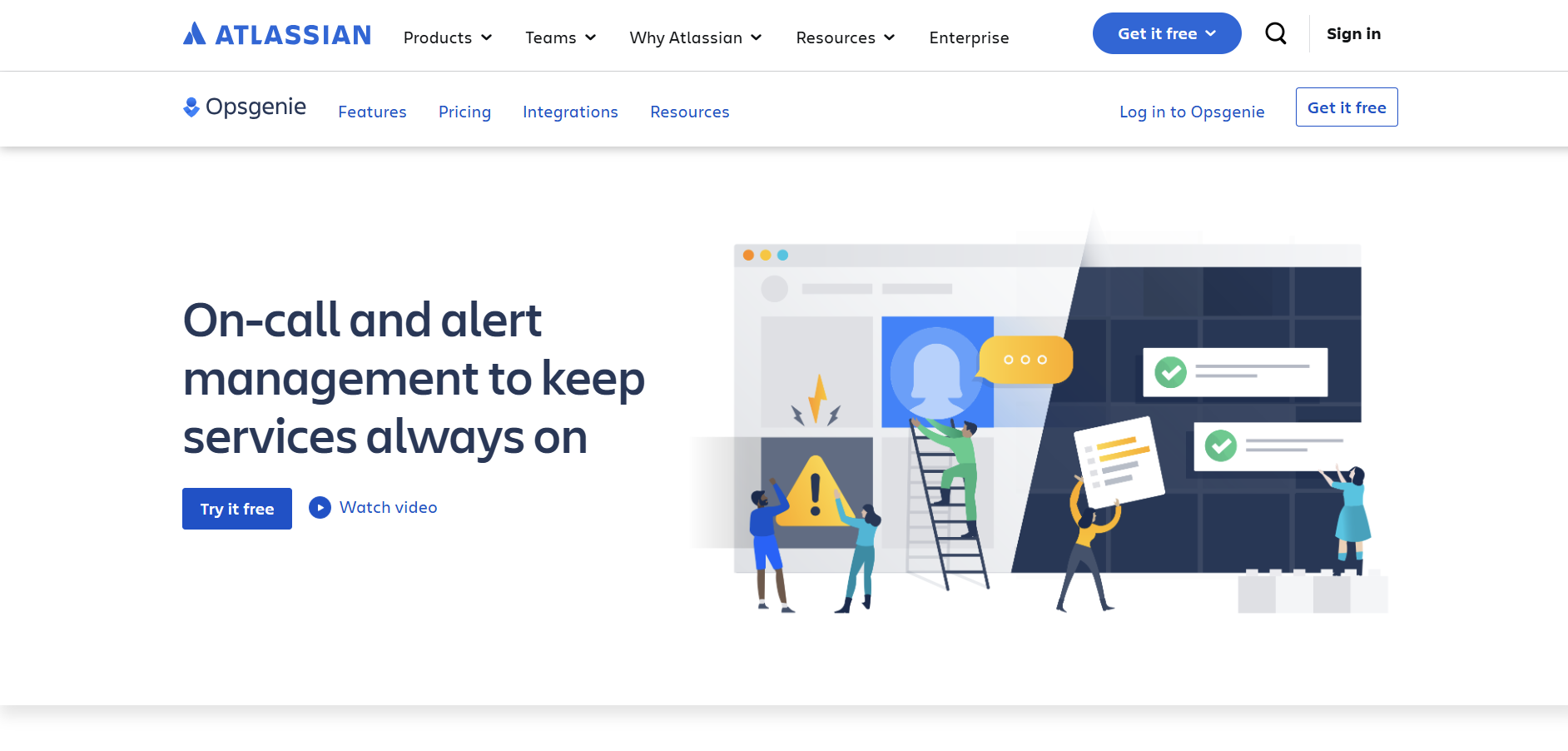
Opsgenie is a comprehensive incident management tool designed to streamline alerting and on-call schedules. It is well-regarded for its ease of use, extensive integrations, and advanced incident analytics, making it a strong alternative to PagerDuty for teams that require reliable alert management.
Opsgenie vs PagerDuty
Opsgenie offers robust alerting and on-call scheduling with a user-friendly interface that simplifies incident management. While PagerDuty provides extensive incident management features, Opsgenie stands out with its flexible integrations and efficient incident routing, catering to diverse team requirements.
Key Features of Opsgenie
Advanced alerting and on-call scheduling
Extensive integrations with monitoring tools
Incident analytics and reporting
Customizable escalation policies
Mobile app support for real-time notifications
Opsgenie Pros
User-friendly interface
Flexible pricing with free and paid options
Strong integration capabilities
Effective incident escalation management
Real-time alert notifications
Opsgenie Cons
May require additional configuration for complex workflows
Some advanced features only available in higher-tier plans
Learning curve for new users transitioning from other platforms
Opsgenie Pricing
Opsgenie offers a free plan with basic features and paid plans starting at competitive rates based on the number of users and incidents handled.
2. VictorOps
VictorOps focuses on enhancing team collaboration during incidents through real-time communication and streamlined on-call management. It is particularly effective for DevOps teams that require seamless incident resolution and proactive alerting systems.
VictorOps vs PagerDuty
VictorOps emphasizes collaboration and real-time communication to quickly resolve incidents. Unlike PagerDuty, which offers a broad suite of features, VictorOps provides a focused approach that enhances team coordination during critical events.
Key Features of VictorOps
Real-time incident collaboration tools
Automated on-call scheduling
Detailed incident timelines and reporting
Integration with chat and collaboration platforms
Mobile notifications and incident logging
VictorOps Pros
Strong emphasis on team collaboration
Intuitive incident timelines
Effective integration with collaboration tools
Customizable alerting and escalation policies
Robust on-call scheduling features
VictorOps Cons
Primarily focused on incident collaboration, may lack some advanced features
Pricing can be higher for larger teams
Limited customization for smaller organizations
VictorOps Pricing
VictorOps offers tiered pricing plans that scale with the size of your team and the level of features required, starting with plans suitable for small teams.
3. xMatters
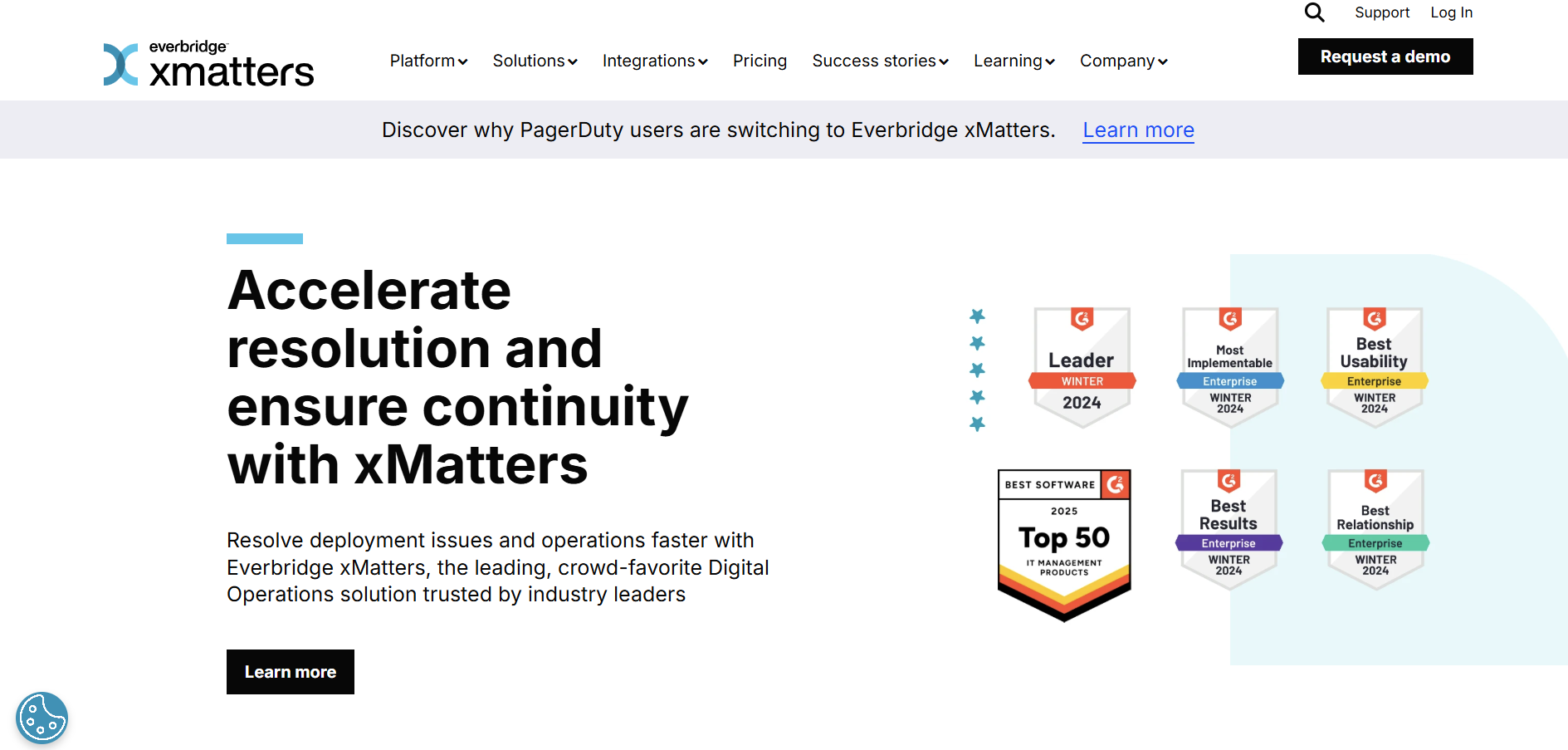
xMatters is a versatile incident management platform that automates communication workflows and streamlines incident resolution processes. Its comprehensive automation capabilities make it an excellent choice for organizations looking to reduce manual intervention during incidents.
xMatters vs PagerDuty
xMatters distinguishes itself with powerful workflow automation and robust communication features. While PagerDuty provides extensive incident management functionalities, xMatters focuses on automating the notification process and ensuring the right teams are alerted at the right time.
Key Features of xMatters
Automated communication workflows
Advanced integration with ITSM and monitoring tools
Customizable alerting and escalation policies
Detailed incident reporting and analytics
Scalable to enterprise-level operations
xMatters Pros
Strong automation features
Highly customizable workflows
Robust integrations with various tools
Effective incident escalation management
Scalable for large organizations
xMatters Cons
Can be complex to configure for smaller teams
Higher pricing compared to basic alternatives
Steeper learning curve for new users
xMatters Pricing
xMatters pricing is tailored to enterprise needs, with plans that scale based on usage and feature requirements, ensuring that organizations pay for the capabilities they need.
4. OnPage
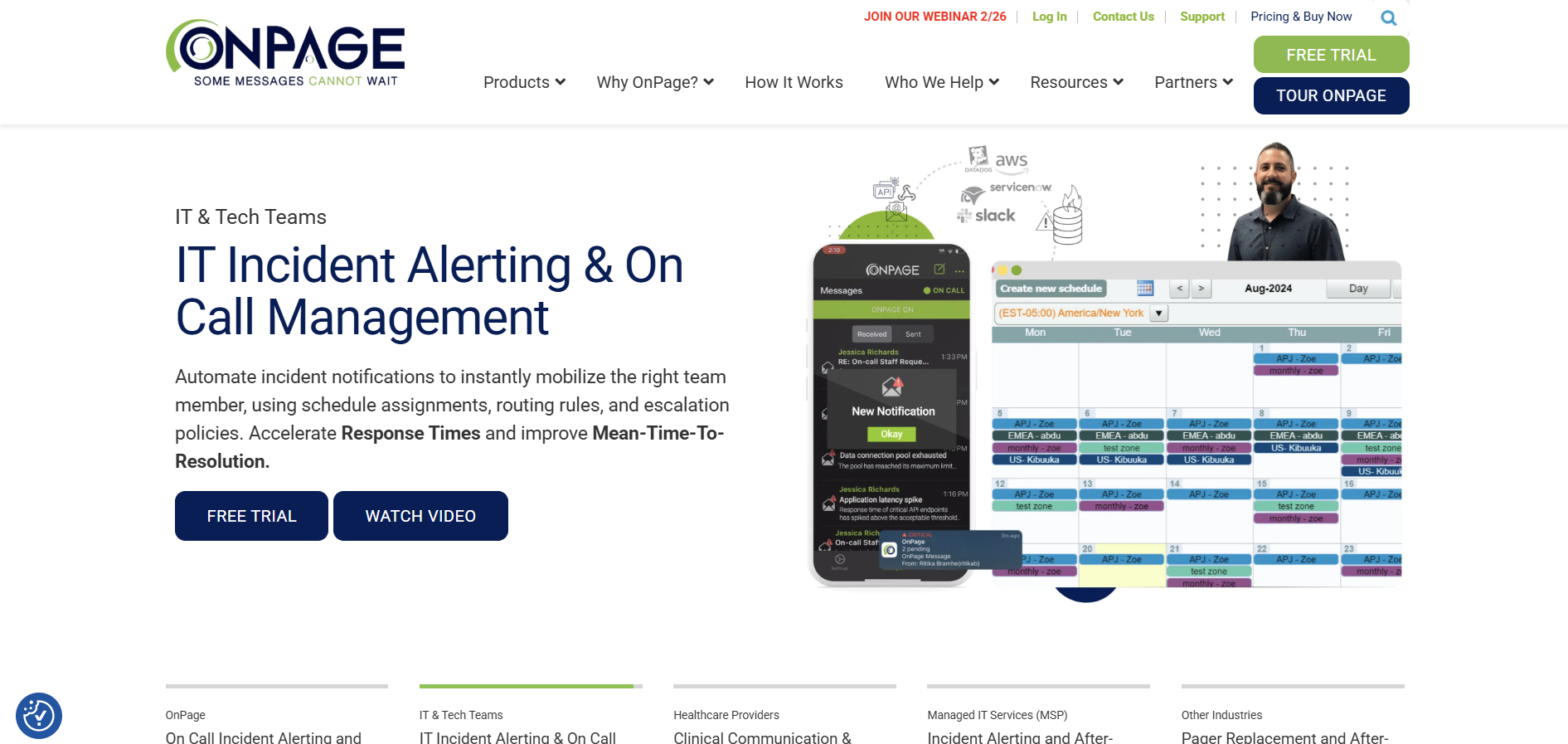
OnPage is an incident alerting tool that emphasizes mobile alerting and rapid response through real-time notifications. It is ideal for teams that need immediate, reliable alerts delivered directly to their mobile devices.
OnPage vs PagerDuty
OnPage offers a straightforward approach to incident alerting with a focus on mobile responsiveness. Unlike PagerDuty’s comprehensive suite, OnPage is designed for simplicity and speed, ensuring that critical alerts reach your team instantly.
Key Features of OnPage
Instant mobile alert notifications
Simple on-call management and scheduling
Real-time incident logging
Customizable alert thresholds
User-friendly interface for rapid setup
OnPage Pros
Very easy to set up and use
Optimized for mobile incident alerts
Cost-effective for small teams
Simple, uncluttered interface
Effective for rapid response scenarios
OnPage Cons
Limited integrations compared to broader platforms
Fewer advanced incident management features
Best suited for smaller teams or basic alerting needs
OnPage Pricing
OnPage offers competitive pricing plans geared towards small and medium-sized businesses, with options that emphasize essential alerting features at an affordable rate.
5. Splunk On-Call
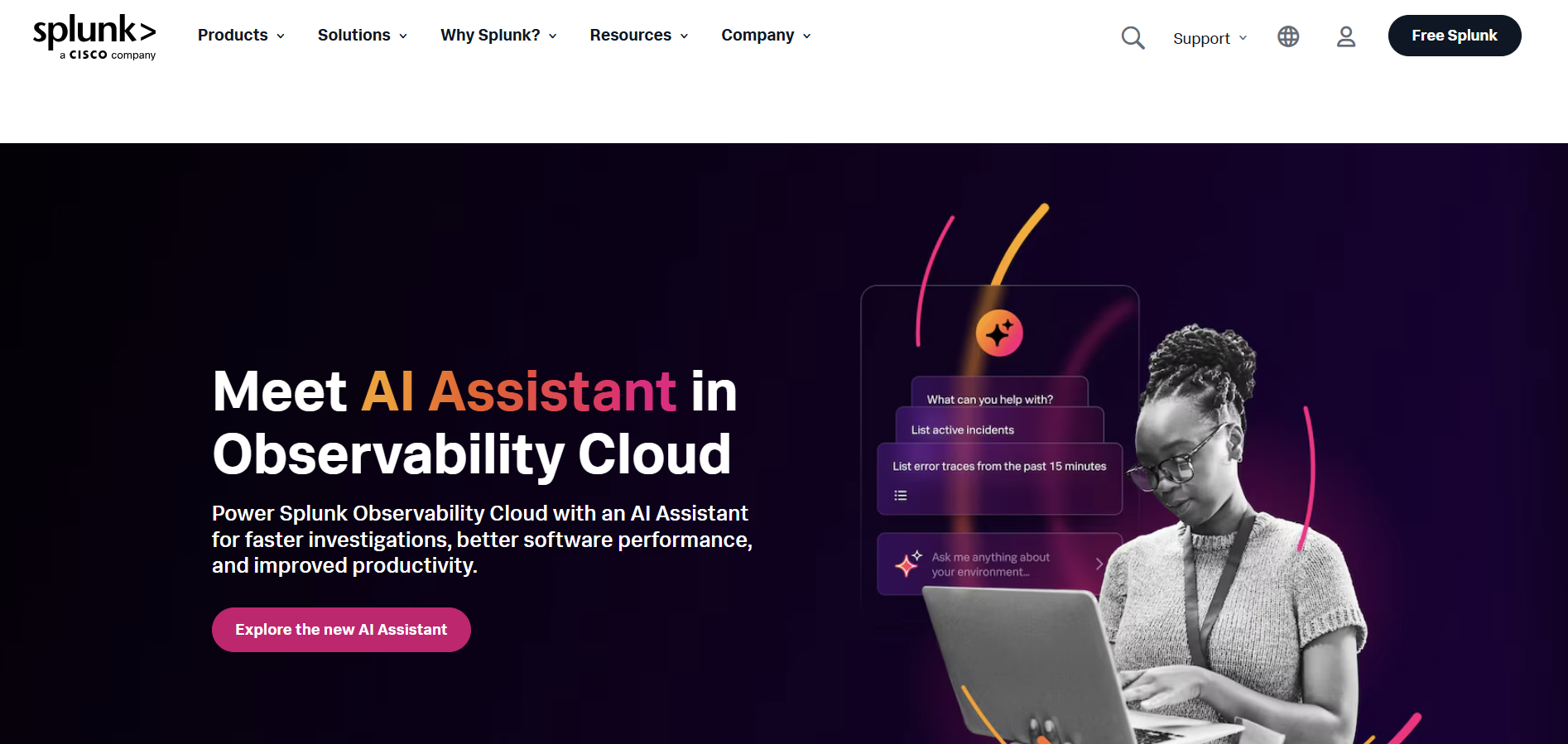
Splunk On-Call (formerly VictorOps’s sibling product) integrates incident management with real-time analytics and monitoring. It provides deep insights into incident trends, making it a strong alternative for organizations that rely on data-driven incident resolution.
Splunk On-Call vs PagerDuty
Splunk On-Call leverages Splunk’s powerful data analytics to offer actionable insights into incidents. While PagerDuty offers robust alerting features, Splunk On-Call differentiates itself through its strong emphasis on data analysis and proactive incident resolution.
Key Features of Splunk On-Call
Integrated incident analytics
Real-time alerting and collaboration
Comprehensive dashboard for incident trends
Customizable escalation and notification policies
Deep integration with Splunk’s analytics platform
Splunk On-Call Pros
Advanced data-driven incident insights
Seamless integration with Splunk products
Robust collaboration and alerting features
Customizable dashboards and reports
Effective for large-scale operations
Splunk On-Call Cons
Can be overwhelming for smaller teams
Higher pricing for comprehensive analytics features
Steep learning curve for users new to Splunk
May require additional configuration for optimal use
Splunk On-Call Pricing
Splunk On-Call offers tiered pricing plans that cater to enterprise-level requirements, with pricing based on the number of incidents and integrations needed.
6. Alerta
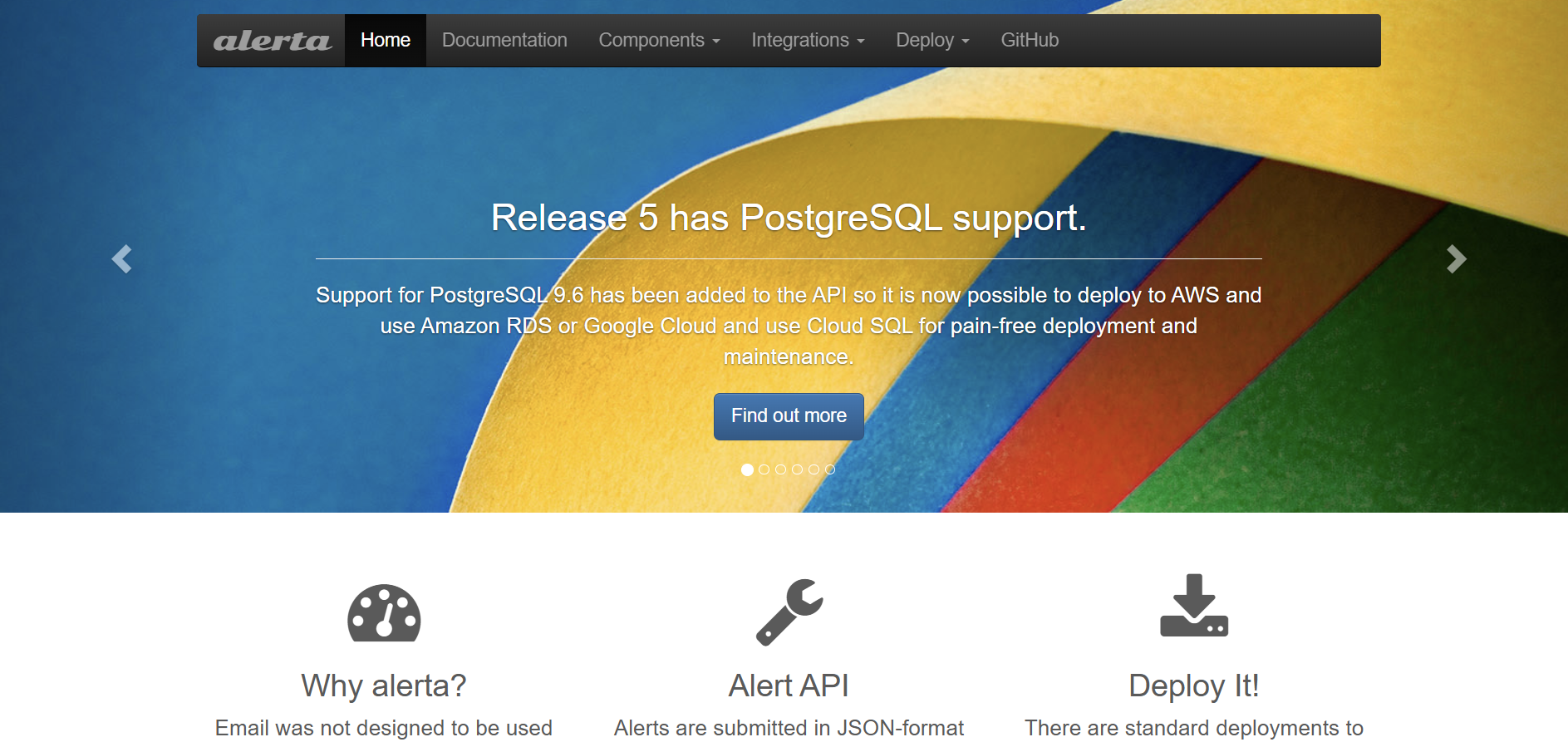
Alerta is an open-source incident management tool that provides flexible alert aggregation and filtering. It is ideal for teams that need a customizable solution without the high costs associated with proprietary software.
Alerta vs PagerDuty
Alerta focuses on flexibility and cost-effectiveness, offering an open-source platform that can be tailored to your specific incident management needs. Unlike PagerDuty’s commercial model, Alerta allows teams to modify and extend its capabilities according to their requirements.
Key Features of Alerta
Open-source alert management
Customizable alert aggregation and filtering
Integration with various monitoring tools
Real-time incident notifications
Community-driven enhancements and support
Alerta Pros
Cost-effective with an open-source model
Highly customizable
Strong community support
Flexible integration with existing tools
No vendor lock-in
Alerta Cons
May require significant configuration
Limited out-of-the-box features compared to commercial tools
Support depends on community contributions
Not as user-friendly for non-technical teams
Requires in-house expertise for customization
Alerta Pricing
Being an open-source solution, Alerta is free to use. However, costs may be incurred if you opt for commercial support or additional hosting and customization services.
7. Freshservice
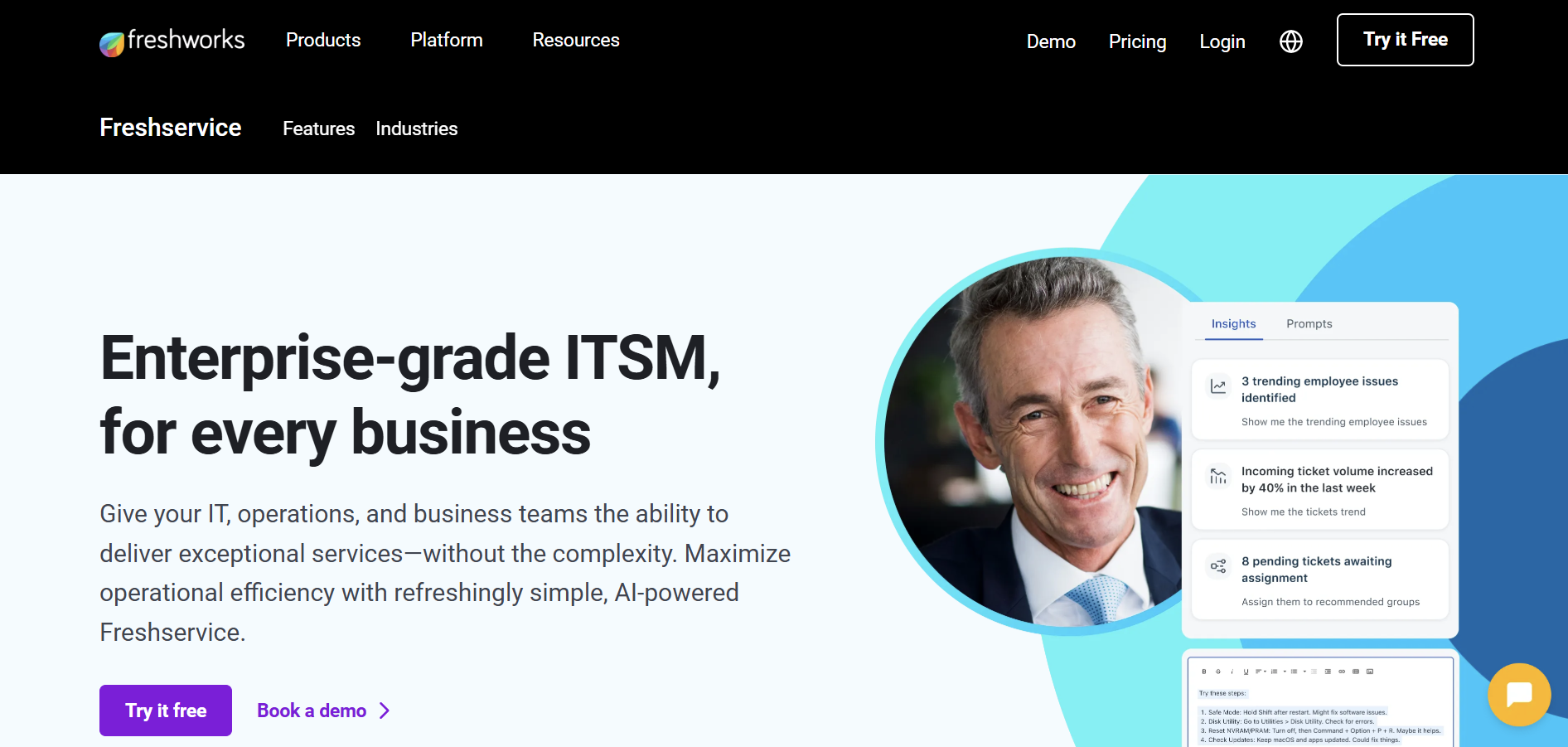
Freshservice is an IT service management (ITSM) solution that includes incident management as part of its broader service desk offering. It is designed for organizations looking to integrate incident management with other ITSM processes.
Freshservice vs PagerDuty
Freshservice provides a comprehensive ITSM platform that integrates incident management with other service desk functions like asset management and change management. While PagerDuty focuses solely on incident alerting, Freshservice offers an all-in-one solution for IT operations.
Key Features of Freshservice
Integrated IT service management
Incident and problem management
Automated workflows and ticketing
Comprehensive reporting and analytics
User-friendly interface for IT teams
Freshservice Pros
All-in-one ITSM solution
Seamless integration of incident management with other IT processes
Cost-effective for small to medium-sized businesses
Robust reporting and analytics
Easy to deploy and manage
Freshservice Cons
May include features beyond incident management that some teams do not need
Less specialized in incident alerting compared to dedicated platforms
Customization options can be limited
Learning curve for comprehensive ITSM features
Pricing tiers may not be ideal for very small teams
Freshservice Pricing
Freshservice offers a range of pricing plans based on the number of agents and features required. They provide both a free trial and tiered pricing plans that scale with your organization's needs.
FAQs on PagerDuty Alternatives
1. What are the top alternatives to PagerDuty?
The top alternatives to PagerDuty include Opsgenie, VictorOps, xMatters, OnPage, Splunk On-Call, Alerta, and Freshservice. These platforms offer diverse features for incident management and alerting, catering to various team sizes and operational needs.
2. Why should I consider using an alternative to PagerDuty?
You should consider an alternative to PagerDuty if you need more specialized features, better integration options, cost-effective pricing, or a platform that aligns more closely with your organization’s unique incident management workflows. Evaluating alternatives ensures that your incident response is both efficient and scalable.
3. Are PagerDuty alternatives free to use?
Many PagerDuty alternatives offer free plans or open-source models. For instance, Alerta is open source and free to use, while others like Opsgenie and Freshservice provide free trials alongside tiered pricing plans.
4. Which PagerDuty alternative is best for team collaboration?
For teams focused on enhancing real-time collaboration during incidents, VictorOps and Splunk On-Call are excellent choices due to their strong communication and collaboration features.
5. Can I integrate these alternatives with my existing IT tools?
Yes, most PagerDuty alternatives, such as Opsgenie, xMatters, and Freshservice, offer extensive integrations with popular monitoring, ITSM, and collaboration tools to ensure seamless incident management across your existing infrastructure.